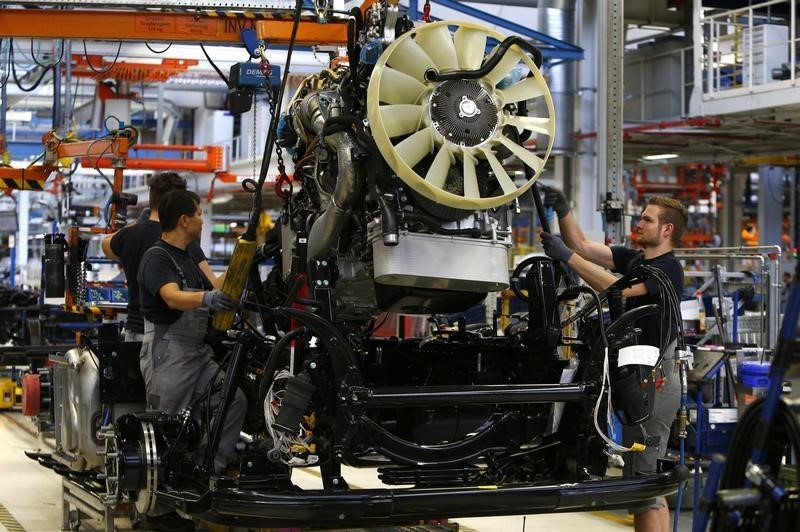By Jonathan Cable
LONDON (Reuters) - Business activity in the euro zone picked up at its fastest pace since mid-2011 this month, and far quicker than expected, as slowing growth in France following the Nov. 13 attacks was offset by a buoyant Germany.
While the upturn in activity may be welcomed by European Central Bank policymakers, Monday's surveys showed firms again cut prices, suggesting ultra-loose monetary policy is doing little to get inflation near their 2 percent target.
"This upbeat survey about the European economy fell short on one important aspect though: inflation," said Bert Colijn at ING. "The survey indicated that despite the strongest output growth and job creation since early 2011, there was still no sign of inflationary pressures."
Even with the ECB injecting 60 billion euros a month of new money through its bond-buying programme since March to support growth and inflation, prices rose only 0.1 percent last month. It is expected to expand the programme in December. [ECILT/EU]
With firms cutting prices for a second month, Markit's Composite Flash Purchasing Managers' Index
That beat the 53.9 median forecast in a Reuters poll. The index has been above the 50 mark that separates growth from contraction since July 2013.
The data pointed to fourth quarter economic growth of 0.4-0.5 percent, Markit said. A Reuters poll published earlier this month suggested growth would be 0.4 percent. [ECILT/EU]
"Overall, euro zone GDP growth of even 0.5 percent will not be sufficient to eat into the vast amount of spare capacity that still exists and help to boost inflation," said Jessica Hinds at Capital Economics.
"We therefore doubt that today's data will be sufficient to dissuade the ECB from increasing its monetary support in December."
The ECB is ready to act quickly to boost anaemic inflation in the euro zone, its president said on Friday, offering the strongest hint yet that the bank will unveil fresh stimulus measures at its Dec. 3 meeting.
Growth in the French services sector slowed although a faster increase in manufacturing activity helped keep the private sector expanding.
Some 60 percent of survey responses from companies in the services sector and just over half in the manufacturing industry were received after the attacks that killed 130 people in cafes, a concert hall and a football stadium last Friday, Markit said.
"We think the key reason for the slowing in services growth is due to the attacks," Markit's chief economist Chris Williamson said.
"Clearly there's been a cut in footfall and any sort of feel-good factor amongst consumers in the wake of the horrific events. But history does tell us that these events tend to have a very short-lived impact."
France's slowdown came as growth in Germany's private sector accelerated, suggesting Europe's biggest economy is defying worries over a slowdown in China and the emissions scandal at car maker Volkswagen (DE:VOWG_p).
Both the German services and manufacturing PMIs were higher than even the most optimistic forecasts in a Reuters poll.
Some of the pick-up across the region can be attributed to a weaker euro
New export orders for manufactured goods came in at their fastest rates in six months, with the sub-index registering 52.8 compared with October's 52.7. That drove the manufacturing PMI up to a 19-month high of 52.8 from 52.3.
An index measuring output, which feeds into the composite PMI, rose to 53.9 from 53.6.
The bloc's dominant service industry expanded at its fastest rate since May 2011. Its PMI reading climbed to 54.6 from 54.1, encouraging firms to increase headcount.
The service sector hired staff at the fastest rate in five years, with the related index climbing to 52.8 from 52.3.

The euro was given a small boost after the PMIs, which also helped Europe's main bourses claw back some of their early losses. [MKTS/GLOB]